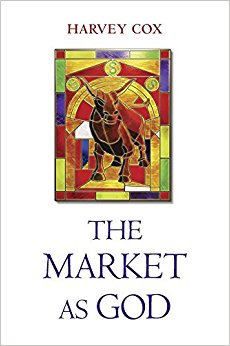The Market as God
by Harvey Cox
–Review by Paula Jones
Considering that I haven’t balanced a checkbook in 30 years, and that I would rather have a root canal than talk to a financial-planner about investment portfolios, it would be an understatement to say that I do not think ‘financially.’ Thanks to a partner who is financially savvy and a little common sense, I have managed to keep my cash flow positive and remain in a state of financial Zen. I tell you this because Harvey Cox’s
The Market as God deals with economics and the market in a way that totally fascinates even me. It is exceedingly accessible.
In it, Cox (Hollis Research Professor of Divinity at Harvard University) speaks prophetically to a humanity that has divinized the world of finance. His stated purpose is to “. . . demonstrate that the way the world economy operates today is not simply “natural” or “just the way things work,” but is shaped by a powerful and global system of values and symbols that can best be understood as an ersatz religion. The term The Market is used as shorthand for the “entire economic and cultural system which it pervades and in which it is the supremely powerful part.”
Cox contends that although the market is a necessary part of human community, The Market has become an idol, an invisible, omnipotent, and omnipresent force that serves as THE Authority for 21st century mankind. With its international influence and all-pervasive power, it operates beyond the reach of national governments. Having become the decisive judge as to what is true, honest, just, pure, lovely, and good, The Market’s bottom line mentality means “everything is for sale; nothing is sacred.” Even human body parts are available for the right price in a religion where “There is no conceivable limit to its inexorable ability to convert creation into commodities”––and vice versa. With corporations more recently receiving human status, The Market (like Victor Frankenstein) has entered the business of creating humans, or at the very least the business of dubious creativity).
Even as Christians give the phrase “In God We Trust” serious lip service, as a whole we realistically place even more trust in mutual funds, securities, blue chips stocks, and hedge funds. We look for security in the military-industrial complex coupled with endless economic growth (that is rapidly reaching the threshold of what the planet can even support). Elections reveal our priorities. The majority of voters are more interested in how policies will affect the pocketbook than the poor, more concerned about the dollar than the destitute.
Cox begins with a short history explaining how over time a necessary market morphed into a god. From there he moves on to demonstrate that like all religions, The Market has its own priests, doctrines, rituals, saints, prophets, and evangelists. For example, marketers serve as evangelists, spreading the good news of whatever the latest miracle product or service is that promises to save you from a life of ordinariness. The liturgical year features major sale seasons such as Christmas, President’s Day, Mother’s Day, and Labor Day. Adam Smith and Max Weber are deemed major prophets. The Market Spirit (Heilige Geist) serves as the life-giving and sustaining breath. Mark Zuckerberg and Bill Gates could easily be viewed as modern-day secular saints. The vocabulary of religion and finance is eerily similar. In both, words such as ‘trust’ and ‘fidelity’ play central roles. The Market even applies the word ‘sinful’ to high-cost luxury items such as fine perfume.
In one of his most interesting analogies, Cox draws fascinating parallels between today’s mega-churches and those financial institutions thought too big to fail. The CEOs of both live in the upper echelons of society, sometimes syphoning their finances from those who can afford it least. Both institutions have highly specialized staff members, consumer-driven services, and multi-million dollar budgets. And in both, “Power, whether business or ecclesial, tends to corrupt.”
Cox’s expended metaphor is most often brilliant and often convicting. It does however occasionally go a little too far. For example, to equate arguments over efficient markets and arguments over papal infallibility stretches his comparison beyond the imagination.
Nevertheless, in an age of conspicuous consumption, obscene salaries for CEO’s, and planetary abuse in the name of ‘god,’ his book is a much-needed eye-opener for those who claim to follow Jesus.
Don’t expect to find typical financial advice in the pages of this gem. Cox is a theologian writing to expose the long-ignored moral lapse in the Christian soul caused when the church itself pays homage to The Market. Thankfully, other voices are joining his. Pope Francis is using both words and actions to speak with prophetic authority about “ideologies which defend the absolute autonomy of the marketplace” and the public’s subservience to this false god. Considering Jesus himself often ‘taught’ theology through the lens of finances, both Cox and Francis are on the right track.

